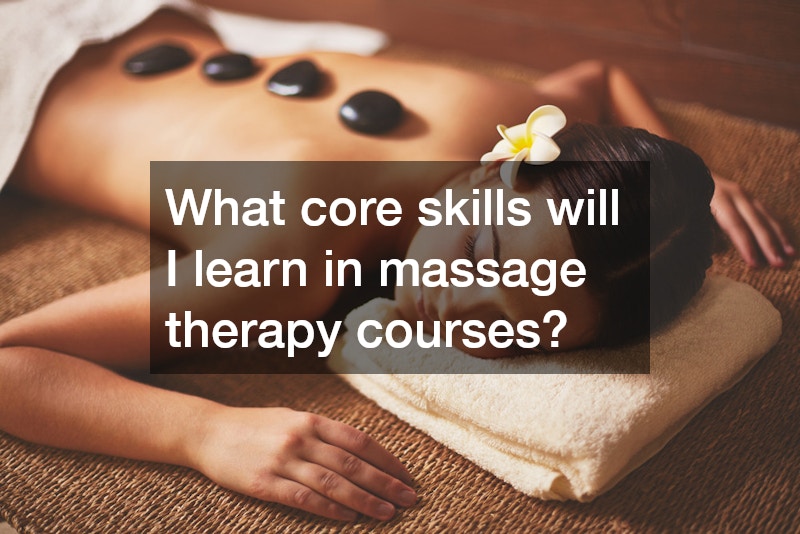In today’s fast-paced world, the demand for skilled massage therapists is on the rise as people increasingly seek holistic and therapeutic ways to manage stress and improve overall well-being. Massage therapy courses are meticulously designed to equip aspiring therapists with a diverse array of skills and knowledge necessary to thrive in this rewarding field. By enrolling in these courses, students will gain invaluable insights into the human body, practical techniques, and professional skills that are essential for a successful career in massage therapy.
What core skills will I learn in massage therapy courses?
Massage therapy courses lay a solid foundation in human anatomy and physiology, which is vital for administering effective treatments. Students delve into comprehensive studies covering muscle groups, the skeletal structure, and various body systems.
This understanding enables therapists to identify tension points and tailor their techniques to address specific client needs, enhancing therapeutic outcomes.
In-depth knowledge of the body’s anatomy not only aids in delivering effective therapy but also helps therapists in preventing potential injuries. By comprehending how different body parts interact, students can recognize symptoms and adapt their massage techniques accordingly. This anatomical expertise is a cornerstone of massage therapy that facilitates holistic healing.
One of the major components of massage therapy courses is training in a variety of massage techniques and modalities. Students gain proficiency in popular styles such as Swedish massage, which promotes relaxation and circulation, and deep tissue massage, which targets deeper layers of muscle tissue to relieve chronic pain. Furthermore, sports massage is also included, catering to athletes by enhancing performance and aiding in recovery.
Practical training sessions ensure that students get hands-on experience in applying different techniques, allowing them to refine their skills. Students learn how to intuitively use their hands, fingers, elbows, and even forearms to manipulate the body’s soft tissues effectively. This practical exposure ensures that they are well-prepared to handle diverse client needs in their professional practice.
How do massage therapy courses prepare me for certification?
Certification is a vital step in becoming a professional massage therapist, and courses are structured to thoroughly prepare students for licensure exams. These courses offer comprehensive test preparation materials and strategies tailored to the exam format, enhancing students’ confidence as they approach the testing process. Practice exams and review sessions are integral components, providing an authentic simulation of the licensure test environment.
A supportive learning environment, driven by experienced instructors, assists students in mastering the theoretical and practical aspects necessary to excel in licensure exams. Complex concepts are clarified through interactive discussions, enabling students to absorb information effectively. This rigorous preparation ensures that graduates not only pass their exams but do so with a strong understanding of all relevant material.
Real-world experience is pivotal in bridging the gap between theoretical knowledge and actual practice, which is why clinical practicums are a key aspect of massage therapy courses. These practicums provide students with opportunities to apply their learned skills in a supervised, real-world environment. Under the guidance of seasoned practitioners, students hone their techniques and learn to adapt to various client needs and conditions.
What career opportunities are available after completing my massage therapy education?
Many massage therapy course graduates choose to pursue entrepreneurial ventures by opening their own private practices. These courses provide essential business management skills, including marketing, client scheduling, and financial planning, which are crucial for establishing a successful practice. Therapists can build sustainable businesses that attract and retain clients by understanding these elements.
Entrepreneurial training often includes strategies for creating a unique brand and client base, offering tailored services that stand out in the competitive market. Students learn how to harness social media and digital platforms to market their services effectively. This knowledge empowers therapists to pursue their passion with independence and creativity while meeting client needs.
The ability to operate a private practice allows therapists to design their schedules and specialize in niche areas of interest. From focusing on wellness and relaxation to sports or clinical massage, the autonomy of entrepreneurship provides ample opportunities for personal and professional fulfillment. Massage therapy courses equip students with the confidence and skills needed to thrive as business owners in the wellness industry.
A career in massage therapy offers an enriching and fulfilling path for individuals passionate about promoting health and well-being. Top massage therapy courses provide the essential knowledge and skills necessary to succeed, from mastering anatomy and practical techniques to understanding professional ethics and business management. By embracing this comprehensive education, aspiring massage therapists can embark on a rewarding career dedicated to healing and empowering others.



